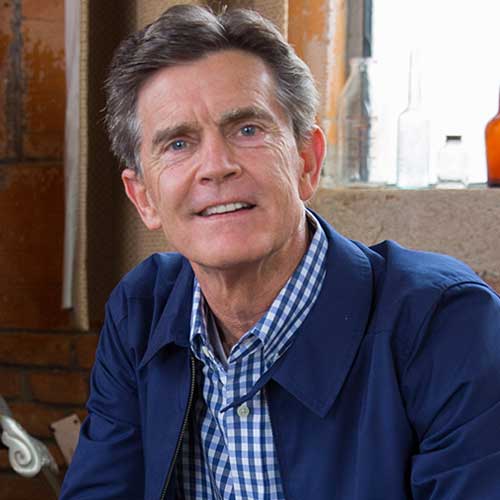Session 5: How to Build Deeper Relationships
Getting Started as a Small Group Leader
Our closest friends make the biggest impact on our lives. In this session, Matt explores three ways the Bible teaches us to connect authentically so that we can experience transformation through our small group.
Status: In Progress
Session ToolsWelcome to session five. This session is all about building deeper relationships. You see, true community is not easy to build. It is not for the faint of heart. In our culture, it seems like many adults don’t have very many close friends. Even those of who have been attending church for a long time, we could be lonely. This is one reason why this session is so important. Everyone needs community. So, in this session, let’s take a look at three principles for building deeper relationships.
The first one is this. Model and encourage authenticity. You see, when questioned about his authority to teach, Jesus pointed to the truthfulness and the authenticity of his life. In John 7:18 he says this, “He who seeks the glory of God,” and he’s talking about himself. “He who seeks the glory of God is a man of truth, there is nothing false about him.” So, to get the context, I encourage you to read the whole passage on your own. But in short, they challenged his credentials. And in fact, what he was saying is, “I’m credible because I’m truthful.” So, let me ask you a question. Why does it matter that there was nothing false about Jesus? Why is integrity so important?
You see, relationships are built on trust. And of course, you already know this. You trust the bank with your money because they have a vault, they have security. You trust the doctor with your health because they have education and experience. And you trust a person with your life because they’re authentic. In fact, Jesus was saying, “You can trust me because my teaching is from God the Father, and my life is authentic,” and we are called to follow his example. You see, taking a risk and being vulnerable with your personal thoughts and feelings isn’t easy. But being authentic with your group, it will help build trust. One way we could be authentic is to admit our confusion and our ignorance. You see, don’t have to pretend you know everything. It’s okay to say, “I’m not sure on that one.” You see, another way you could be authentic is to be open about your personal brokenness. Now, you don’t need to go in and list all of your sins in great detail, but pretending that you’re perfect, it won’t build deeper relationships in your group.
The second idea for building deeper relationships is this. Hold one another accountable. You see everyone has struggles and we all need support. The truth is, is that we’re better together. In Ecclesiastes 4, it says this, “Two are better than one, because they have a good return for their labor. If either of them falls down, one can help the other up. But pity anyone who falls and has no one to help him up.” You see when we are connected to others, our lives are more effective and we have help when we fall. In the spiritual life, accountability gives another person permission to check up on you and the commitments that you’ve made to God. You see, accountability breaks down a couple different ways that I’ve seen through the years, and I want to go through those.
One way it breaks down is when we don’t want it ourselves. And so, if I don’t want accountability, then I’m not going to hold other people accountable. Second way it breaks down is when we tell other people where they need to be held accountable. “You need to stop being lazy.” or, “You need to read your Bible more.” Another way that accountability breaks down is that when others fail, we could be too judgmental and we’re too condemning. Truth is, people already feel guilty. They don’t need us to heap on more guilt. It’s the job of the Holy Spirit to convict. And last time I checked, I wasn’t a member of the Trinity and you weren’t either. Maybe you’re just kind of thinking, “Well, I just tell it as it is.” Well, what if he did something different? What if you told it like it could be? You see, accountability happens when you want it for yourself and when you let others choose it, and when you show grace when they fail.
Here’s the third idea for building deeper relationships. And it’s to avoid the quick fix. Have you noticed that life isn’t very easy? I’m only 45 years old. I’ve been following Jesus for more than 30 years. And sometimes I wonder, is it ever going to get any easier? Truth is on this side of eternity, God allows confusion and pain and suffering. These seasons are a reality in our lives. Paul talked about his own suffering. In 2 Corinthians 4, he said this, “We were hard pressed on every side, but not crushed. Perplexed, but not in despair. Persecuted, but not abandoned. Struck down, but not destroyed.” And through all this pain, was God faithful? Absolutely. But in all this pain, did Paul want it to happen? I doubt it. You see, when we’re in seasons like this, the natural response is to get out as soon as possible. Of course, that’s not wrong, but we need to do something more. We need to avoid the quick fix. And we also need to ask God, “What are you trying to teach me through this?” And listening to that answer can take a long time.
You see, we live in an instant everything society. Regular mail isn’t quick enough, and so we have electronic mail. An email isn’t quick enough, so we have instant messages. And even our food has to be fast. And if it takes too long to drive there, you could have it delivered. Instant gratification isn’t new to human nature. This is why the Bible tells us to be patient and develop perseverance and to wait on the Lord. Unfortunately, when it comes to matters of the soul, the pace is often slow. We need to swim against the currents of our culture and wait patiently for God to speak. The quick fix is so tempting, but it also misses out on what God is doing in our hearts. So, when someone in your group is hurting, be supportive, but don’t be so quick to jump in and fix it.
As we wrap up, we’ve seen that we could build deeper relationships and three different ways. The first is by modeling and encouraging authenticity. Number two, by holding one another accountable. And finally, number three, by avoiding the quick fix. Now you don’t want to miss our final session, because in this, we’re going to talk about perseverance and how do we grow as a leader.





Talk About It
Share with others enrolled in this Online Course